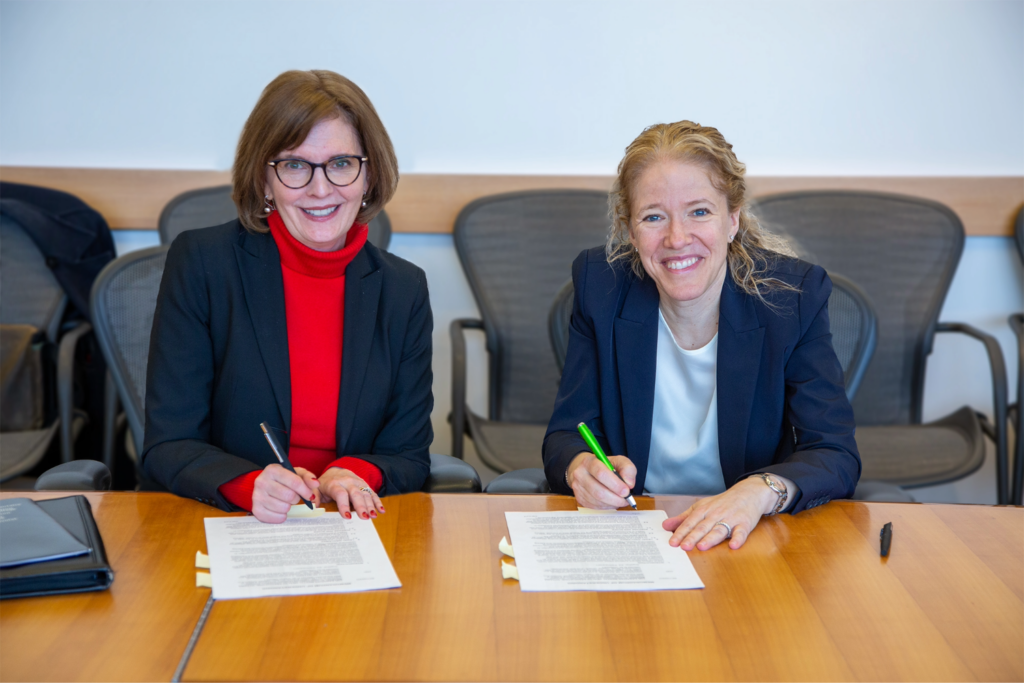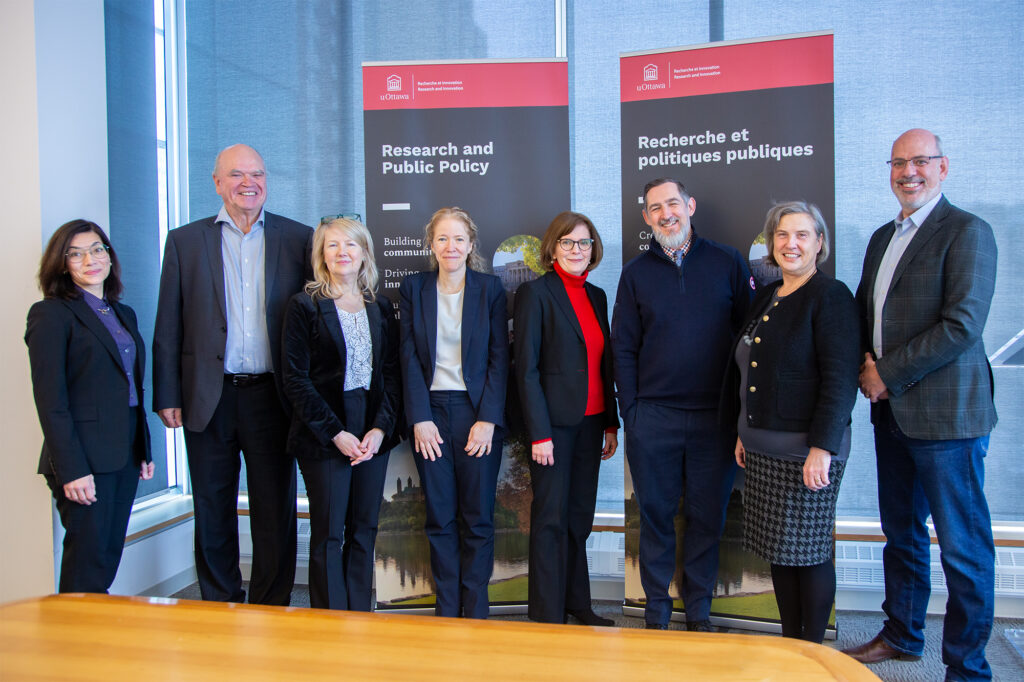Menu
Close

CMHA Ottawa and uOttawa formalize three decades of research and innovation in community mental health with special Memorandum of Understanding
Jan 13, 2025
MoU strengthens CMHA Ottawa and uOttawa’s shared commitment to advancing expertise, fostering partnerships, and increasing collective impact on mental health, substance use, and housing challenges at community level
[Monday, Jan. 13, 2025 – Canadian Mental Health Association, Ottawa Branch] – At CMHA Ottawa, we are excited to announce that we have signed a Memorandum of Understanding with the Office of the Vice-President, Research and Innovation at the University of Ottawa, ensuring continued collaboration in research and innovation in community-based mental health care.
For more than three decades, CMHA Ottawa and uOttawa’s collaborative research and evaluation activities have educated learners while providing vital evidence in the field of community-based care while serving some of the city’s most marginalized individuals.
As an important part of the healthcare continuum, at CMHA Ottawa, we primarily provide community-based programs and services to eligible individuals that live with severe and persistent mental illness and/or substance use disorder, many of whom are experiencing chronic homelessness.
An essential part of our identity is our focus on student learners and research partnerships. As the community sector is a thriving but often overlooked and misunderstood part of the healthcare system, this MoU will embed our organization and uOttawa as longtime contributors of evidence to the field—with much more to come.
uOttawa ranks among Canada’s top 10 research universities. The Office of the Vice-President, Research and Innovation—or OVPRI—sets the strategic direction and oversees the administration of the university’s research enterprise, including funding, equipment and facilities, international collaborations, partnerships and business development.
Indeed, CMHA Ottawa and uOttawa share a long and storied past. Look no further than the presentations at our annual Bright Ideas webinar series, which highlights the many projects our staff, management, peers and clients have undertaken with students and faculty at uOttawa (and other valued partners) to advance research and evaluation in mental health, substance use, and housing and homelessness services in the community sector.
Our collaborations with uOttawa over the years have most notably been with the Faculty of Social Sciences (e.g., the Centre for Research on Educational and Community Services (CRECS) and the School of Psychology), and the Faculty of Medicine—but not limited to those faculties.
What this MoU means for our shared future is a commitment from both organizations to open new pathways for advanced collaboration. It also indicates that we at CMHA Ottawa have the honour of remaining an active partner and contributor to the education of future professionals in the field, while opening new doors as well.

Monday, Jan. 6, 2025: Dr. Susan Farrell, CEO, CMHA Ottawa, and Dr. Julie St-Pierre, Interim Vice-President, Research and Innovation, uOttawa, sign the MoU. Photo by Ahmed Habbachi.
The morning of Monday, Jan. 6, 2025, CMHA Ottawa’s CEO, Dr. Susan Farrell, joined Julie St-Pierre, Interim Vice-President, Research and Innovation at uOttawa, in signing the landmark MoU, making official a long-standing tradition of collaboration that spans more than 30 years.
The signing ceremony took place in the Faculty of Social Sciences building at the uOttawa campus. Speakers included Victoria Barham, Dean, Faculty of Social Sciences; Martine Lagacé, Associate Vice-President, Research Promotion; and Cintia Quiroga, Director, Research and Public Policy, uOttawa.
Also in attendance were a range of distinguished educators and valued colleagues, including Drs. Donna Pettey and Maryann Roebuck, co-Directors of Integration, Research and Evaluation at CMHA Ottawa; Board Chair, Peter Donnelly; Former Chair, Nabanita Giri; and Board Member Tina Fisher.
This groundbreaking and innovative MoU was developed thanks to the vision of some key stakeholders. First and foremost, it was sparked by an idea from Dr. Tim Aubry—now an emeritus professor with the School of Psychology and the Faculty of Social Sciences and the first ever Researcher in Residence at CMHA Ottawa—who set to work with Dr. Farrell on drafting the MoU more than a year ago.
We would like to thank Dr. Aubry for his vision, his dedication and his many years of being one of our most valued and steadfast partners at CMHA Ottawa.
We would also like to thank Julie St-Pierre, Interim Vice-President, Research and Innovation; Sylvain Charbonneau, former VP, Research and Innovation; Victoria Barham, Dean at the Faculty of Social Sciences; and Mark Salter, Vice-Dean, Research and Professional Development, uOttawa, for their vision, support and valuable assistance.
We also offer our sincerest thanks to Cintia Quiroga for all of her efforts to make this MoU a reality, and the Faculty of Social Sciences, including CRECS and the School of Psychology, and the Faculty of Medicine—particularly Dr. Claire Kendall, Associate Dean, Social Accountability, for the wonderful partnership opportunities, and Dr. Simon Hatcher, Chair of the Department of Psychiatry, for his ongoing support to CMHA Ottawa. Lastly, we would like to thank Camille Quenneville, CEO of the Ontario Division of the CMHA, who came to Ottawa from Toronto for the occasion. Camille’s support—and that of her whole team at CMHA Ontario—is unwavering and essential, as they advocate for the systems change necessary to implement our bright ideas more widely and ensure mental health for all.

From left: Cintia Quiroga (Director, Public Policy Research and Outreach, uOttawa), Dr. Tim Aubry (Emeritus Professor, uOttawa), Dr. Martine Lagacé (Associate Vice-President, Research, Promotion and Development, uOttawa), Dr. Julie St-Pierre (Interim Vice-President, Research and Innovation, uOttawa), Dr. Susan Farrell (CMHA Ottawa CEO), Mark Salter (Vice-Dean Research, Faculty of Social Sciences, uOttawa) Victoria Barham (Dean, Faculty of Social Sciences, uOttawa) and Peter Donnelly (CMHA Ottawa Chair). Photo by Ahmed Habbachi.
The Memorandum of Understanding is a point of pride and gratitude for us at CMHA Ottawa. There’s no understating what it means for us all.
We are thrilled that we will continue our rich tradition of working with a range of learners to gain experience and contribute to research and evaluation in their areas of study. These learners will surely carry with them their experience of working in the person-centered approach of the dedicated staff at CMHA Ottawa.
For our shared future, this MoU means a commitment from both organizations to open new pathways for advanced collaboration. The most important part, however, is what it will mean for the people we serve:
This MoU signifies continuous improvement in the quality of services offered to clients of CMHA Ottawa and other community-based care providers. It means students at uOttawa will contribute their talents and hard work to a vital and growing part of the healthcare system, advancing research and evaluation in mental health, substance use, and housing and homelessness services in the community sector.
The Canadian Mental Health Association, Ottawa Branch (CMHA Ottawa), is an independent, community-based non-profit organization that provides services for eligible individuals in the Ottawa area with severe and persistent mental illness and/or substance use disorder, many of whom are experiencing chronic homelessness or are vulnerably housed. CMHA Ottawa is dedicated to promoting good mental health, developing and implementing sustainable support systems and services, and encouraging public action to strengthen community mental health services and related policies and legislation.
For media inquiries:
Patrick Jodoin, Manager, Communications and Stakeholder Relations
CMHA Ottawa
613-737-7791 ext. 135 [email protected]